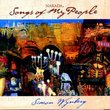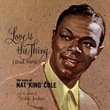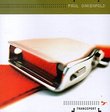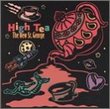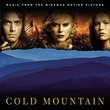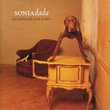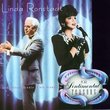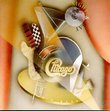| All Artists: Joe Henderson Title: Big Band Members Wishing: 1 Total Copies: 0 Label: Polygram Records Original Release Date: 10/22/1996 Release Date: 10/22/1996 Genres: Jazz, Pop Styles: Modern Postbebop, Swing Jazz, Bebop Number of Discs: 1 SwapaCD Credits: 1 UPCs: 731453345126, 0731453345126 |
Search - Joe Henderson :: Big Band
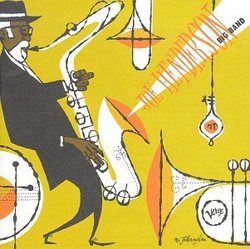 | Joe Henderson Big Band Genres: Jazz, Pop
As a teenager, Joe Henderson caught the tail-end of the big-band era in the '50s and became enthralled in particular with the Stan Kenton Orchestra and Gil Evans' work with Miles Davis. Even though Henderson started record... more » |
Larger Image |
CD DetailsSynopsis
Amazon.com As a teenager, Joe Henderson caught the tail-end of the big-band era in the '50s and became enthralled in particular with the Stan Kenton Orchestra and Gil Evans' work with Miles Davis. Even though Henderson started recording in 1963, when jazz-orchestra opportunities had become rare, it's a shock to learn that Joe Henderson Big Band is the saxophonist's first-ever album with a large ensemble. Far from being a nostalgic look back at the days of Basie and Ellington, however, it's a modernist project that suggests where Kenton's and Evans' innovations might have led if the economic bottom hadn't dropped out of the big-band genre. --Geoffrey Himes Similar CDs
Similarly Requested CDs
|
CD ReviewsGreat writing, screamin' band. (a former band member) Zafro | Gilbert, AZ United States | 04/10/2002 (5 out of 5 stars) "For those familiar with Joe's music in small group settings only, this recording reveals another brilliant aspect of his artistic vision. I had the pleasure of playing trumpet in Joe's band the year after this disc was released (those interested can view gig photos at jameskass.com), and know that this was the fulfillment of a project he had started some 25-30 years earlier in New York as a weekly rehearsal band, his original motivation for penning a lot of these arrangements. Regrettably, this would be the last project wherein Joe was allowed to record his own compositions, and while he enjoyed the success and Grammys of his other "theme" albums produced by Verve late in his life, he expressed to me that he resented being dictated to by the record execs and not being given more opportunities like this, wherein his compositions were the focal point.Like his playing and compositions, Joe had a unique arranging style, and I can recall sweating over some of the insane lines he wrote for us brass players as if he were writing for saxophones! ;) It's too bad that they didn't make this a double CD, as he had many more great charts that we would perform live that were never recorded/released. This album includes several hip arrangements from other talented writers (e.g. Slide Hampton), as well.There are many outstanding solos from sidemen here: in particular, check out Chick's solo on Isotope and Nicholas Payton's on Step Lightly (perfectly constructed, for those students of jazz out there). Joe plays beautifully and consistently, as usual, and I would assert that this is a *must have* for lovers of Joe Hen's music or contemporary big bands." Big Fun! M. Allen Greenbaum | California | 07/07/2000 (4 out of 5 stars) "I wasn't a fan of big band music (except for Basie and Ellington, who somehow didn't fit my definition of big band) until my friend Brian pointed out I was wrong thinking that the format precluded most solos of note. This album showcases both the solo work of Henderson and other luminaries, while still playing tight, sympathetic ensemble work. The CD is effective on both levels. The music can be intimate (Isotope, a beautifully realized tribute to Monk featuring Henderson and Corea) or big and brash ("Inner Urge") or, as in the majority of pieces here, both."A Shade of Jade" features Henderson and Hubbard with some good punch, ultimately, though, I found it a little too long (8.22). Things are more in focus on "Step Lightly," a mellow blues by Henderson with interesting solos by Henderson, Corea, and Nicholas Payton on trumpet. First recorded in 1963, it has a great straight-ahead sound that is slightly reminiscent of some of Miles' early work, and with the relaxed spacing of a Basie arrangement. "Serenity" features, once again, outstanding work by Henderson and Corea, and a satisfying arrangement that must be a powerhouse live. I've always loved Billy Strayhorn's "Chelsea Bridge," and Henderson gives it the appropriate film noir treatment. The orchestra mostly lays out at first, but then opens up as Henderson swings it in new directions with a brief return to the main theme. "Recordame" has a nice Brazilian beat, and Henderson's pure clear sound layers over the percussion, but, once again, I find the excursion just a bit repetitive. Overall, though, this is a very satisfying CD, and it wears well after several years. Worth a listen, you'll enjoy it." Why didn't he do this more often? Kevin W. Celebi | Greencastle, IN | 03/09/2008 (5 out of 5 stars) "Joe Henderson, always looking back to the past and right into the future, captures that musical nature on his BIG BAND recording. He welcomes old favorites of jazz's heyday such as Chick Corea, Freddie Hubbard, and Joe Chambers in addition to young lions like Nicholas Payton and Christian McBride.
Recorded very much in the polished Verve mold, the music of BIG BAND is clearly not content to dwell on Henderson's past achievements. The arrangements are absolutely flawless, with little emphasis on blowing and more on Henderson's compositions and musical taste. The songs comprise of seven of Henderson's best originals in addition to two of his favorite standards (Chelsea Bridge and Without a Song). Henderson's playing is ageless - he sounds as technically facile and expressive as he was in the 60's. The stars of the improvisations, besides Henderson himself and pianist Chick Corea, are two of jazz's best trumpeters, Freddie Hubbard and Nicholas Payton. Hubbard sounds very sharp and explosive in his solo on "Shade of Jade," showing barely any signs of his impending chop disaster the next year. Payton, at the tender age of 22, is in true hard bop form, sounding like a conglomerate of Hubbard, Lee Morgan, and Clifford Brown, mixed in with his own bag of blues and chordal weaving, taking outstanding solos on "Step Lightly" and "Recorda-Me." Mix such excellent solos with the tight arrangements, and you have an album that's right on the money. The album almost serves as a summary of Henderson's career. "Isotope" was recorded several times in the 70's for the Milestone label and gets the bluesy treatment it deserves. "Inner Urge" maintains its probing and harmonic consistency, calling back to the classic Blue Note session that had McCoy Tyner on board. "Black Narcissus," another classic from the 70's, sees the band essentially stepping out of the way so Henderson and Corea can take extended solos over the haunting classic waltz's chord changes. "A Shade of Jade" from the Blue Note album "Mode for Joe," one of Henderson's most recorded tunes, has strikingly original passages mixed in with its familiar up-tempo minor romp. "Step Lightly" is a lesser-known Henderson tune, blown out of the house by the ever soulful and amazing Payton; "Serenity" boasts a Henderson solo with so many musical ideas, yet he's not "searching" for a million ways to say them, as Trane did so often early in his career. "Recorda-Me," by far Henderson's most famous composition, is played with the power and majesty of Gods, with magical solos by Henderson and Payton supported by an intense Latin groove courtesy of Chick Corea and Lewis Nash. Henderson was at the forefront of jazz for most of the 60's and 70's, but was mainly "taken for granted" for the last 20 years or so of his life. It's a shame that such a giant of his instrument (probably one of the top 3 innovators of the tenor saxophone) fell into public disinterest as a victim of pop music and young lions. "Big Band" is a chance for you to hear Henderson urgently (yet calmly) relaying his musical passions and message through the mouthpiece of an excellent jazz ensemble while he was still in his prime at the age of 55 and 59 (this album was recorded in 1992 and 1996). If you were to be forgiven for picking one track from "Big Band," it would be ISOTOPE. The groove set up by the ensemble is so tight and the solos by Corea and Henderson are frighteningly distracting (good background music this does not make since it's so top notch). Henderson, as always, tells a story by searching throughout the entire register of his saxophone while the ensemble plays bluesy and downright raunchy background passages. Isotope isn't the most conventional of blues because of its harmonic structure, yet it sounds so fresh and inventive because of the arrangement - who was the arranger on this session? (Watch it turn out to be some college student - I have no idea who it is, but what s/he did with Isotope is absolutely spellbinding). Listening to Henderson's BIG BAND is one of the most joyous experiences in jazz - a taste of the past, the modern, the future, and Henderson's always excellent gamboling on his instrument. The thickets of his imagination were dense and endless, and this recording expands that truth to the scope of a large ensemble - what could be better? " |

 Track Listings (9) - Disc #1
Track Listings (9) - Disc #1
